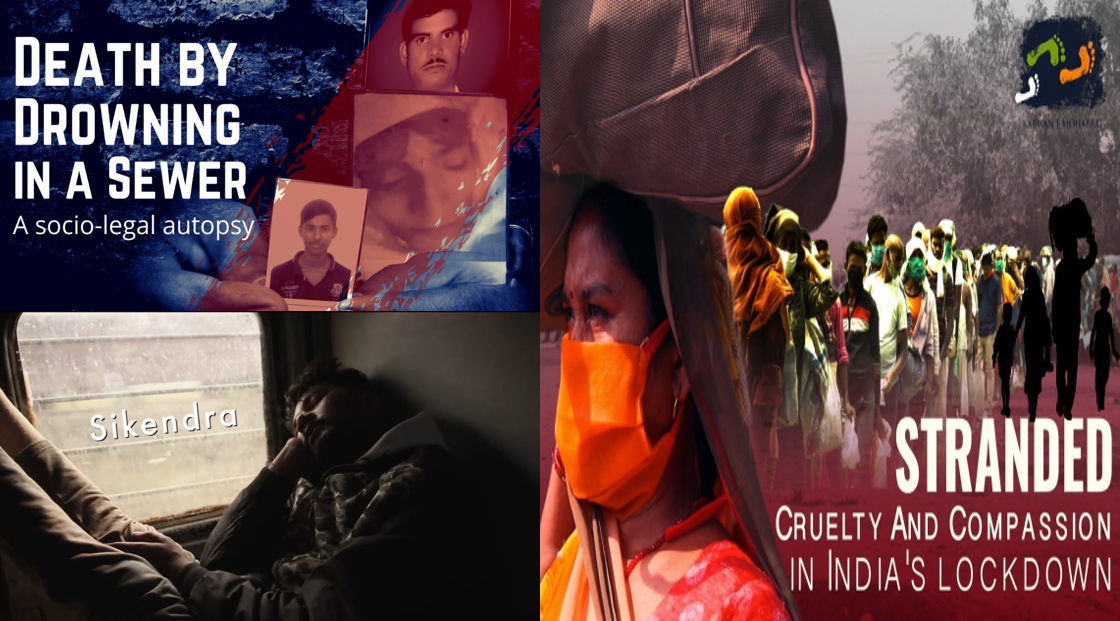Fighting for justice through film
 © Anam Sheikh and Karwan e Mohabbat (original images)
© Anam Sheikh and Karwan e Mohabbat (original images)
A new Lancaster film club showcases the stories of people struggling against exploitation and injustice around the world and offers the chance to talk to the filmmakers and activists supporting them.
The Many Worlds Film Club is being run by two Lancaster University lecturers from the Lancaster Environment Centre Political Ecology Group, which focusses on environmental and social justice. Dr Emma Cardwell and Dr Sally Cawood hope that showing the films and talking to film makers can help raise awareness of some of the major injustices faced by people across the globe.
Everyone is welcome to the free screenings, held in person at the Gregson Community & Arts Centre in Lancaster. The first screening in May was of the Mexican documentary, Tolvanera, about the Ejido El Bajio farming community’s legal and political struggle against the Fresnillo mining company, which is exploiting their land. The second screening (register here), on 12 July, will show three short documentaries about the exploitation of workers in India, including those who clean human waste from septic tanks by hand, with deadly consequences.
Emma, who is researching the tensions between state led agroecology programmes and peasant livelihoods in Mexico, was asked by London Mexico Solidarity to arrange the Tolvanera screening in the run up to Fresnillo’s annual shareholders meeting in London. The film’s director, Angel Melgoza, joined the screening via zoom and took part in a post film discussion.
“If you just watch a film and see a horrible injustice that is happening on other side of the world, you can feel powerless,” said Emma. “Having a conversation with someone like Angel, makes a connection and moves it from being overwhelming to being more empowering, as it makes you aware of the impact of witnessing someone's struggle. So, we will always have a discussion with the film maker or activists at every screening.”
Alison Cahn, a local resident who attended the first film showing, said: “It made a huge difference having the film maker there and hearing about his experience making the film, and the threats and challenges that he faced. It felt that we were supporting the cause just by being there watching the film.”
Alison, a former journalist and film maker herself, was able to use her connections to get the national Guardian newspaper to cover a protest by the Mexican farmers outside the Fresnillo shareholders meeting, raising awareness of the issue further.
The next screening, on 12 July, organised by Sally, showcases the work of an Indian film making collective – Karwan e Mohabbat – and the Centre for Equity Studies in Delhi, who Sally has been working with since 2019.
Sally’s research, which focusses on the everyday experience of people involved in handling human waste by hand or with basic tools, has funded one of the films. It highlights the aftermath and legal struggles for justice, amongst the families who lost their brothers, sons or fathers to manual scavenging in India - “an extreme form of caste-based slavery”.
The other two documentaries focus on the people who migrate from villages to the city in hope of a better life only to return home, and the devastating impacts of lockdown for migrant workers during the Covid 19 pandemic.
Three film makers from the collective - Natasha Badhwar (Director), Sandeep Yadav (Videographer) and Anam Sheikh (Editor) – are joining the screenings via Zoom, with support from long-time mentor and collaborator, Harsh Mander of the Centre for Equity Studies.
Natasha said: “Making films that represent the voices and stories of those who have not only been marginalized and systematically exploited but also made invisible is really just the first step. The real work is taking the films to diverse audiences - across generations, cultures and borders.
“Globally, we are witnessing the decline of democratic values and the world around us seems to be lurching towards fascism. This makes it urgent for us to facilitate dialogue and debate and efforts like the Many Worlds Film Club and screening documentaries will go a long way towards that.
“We need an activism of hope and peace that reassures us that progressive values will be restored and collectively we can take responsibility towards reducing injustice and inequality across societies.”
“There is an open invitation to the screenings,” said Sally. “We think it is important to highlight these issues and for the people involved to know that we care. I hope that we can discuss what we can do to further support international colleagues working on these challenges.”
The Lancaster Environment Centre is paying for the cinema in the Gregson Centre, where the films are shown, for the rest of the academic year. Emma and Sally have a number of films from different areas of the world lined up and hope to get funding to continue the film club next year.
---
Book at place for the July film club here, or find more information about future screenings here.
---


